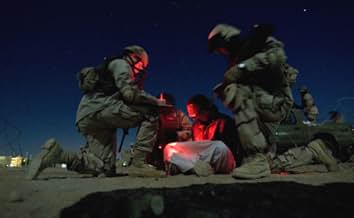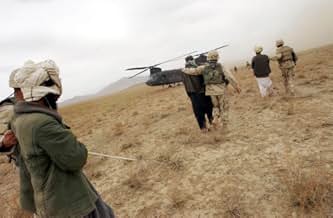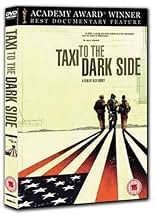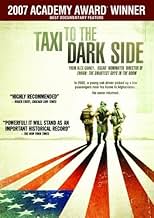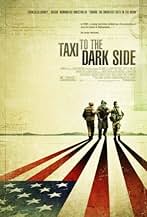Alex Gibney exposes the haunting details of the USA's torture and interrogation practices during the War in Afghanistan.Alex Gibney exposes the haunting details of the USA's torture and interrogation practices during the War in Afghanistan.Alex Gibney exposes the haunting details of the USA's torture and interrogation practices during the War in Afghanistan.
- Won 1 Oscar
- 10 wins & 5 nominations total
Alex Gibney
- Narrator
- (voice)
Moazzam Begg
- Self - Torture Victim
- (as Moazzam Beg)
George W. Bush
- Self
- (archive footage)
Jack Cafferty
- Self
- (archive footage)
Dick Cheney
- Self
- (archive footage)
Lynndie England
- Self
- (archive footage)
Tommy Franks
- Self - General
- (archive footage)
- Director
- Writer
- All cast & crew
- Production, box office & more at IMDbPro
Featured reviews
9imxo
There is something you need to know about this film: it is not about real insurgents or terrorists or about real soldiers, and it is certainly not an anti-American film.
It is about how senior military and civilian officials demand results from their subordinates, even if the results are to be obtained by unconscionable, immoral, and illegal means, up to, and including, torture and murder. The fact that many of these results - what the military like to call "the mission" - are faked or just wrong is of no particular concern to them. Naturally, you'll never find a document signed by any of those officials advocating torture and murder. The most you'll ever find is a reference to "enhanced interrogation techniques" (i.e., torture). And if a detainee dies, the senior officers and officials always benefit from "plausible deniability" and claim that it must be the fault of junior "bad apple" troops. If terrorists are murderers, some of our own troops have certainly engaged in murder, too. To reveal this is not anti-American; it's just a simple fact. Because the troops often do it in a group they think they're not murderers. Just as, I imagine, someone who participates in gang rape does not consider himself, individually, to be a rapist.
While most Military Police (MP) troops are fighting hard on the ground every day in Iraq and Afghanistan, one group of troops which this film examines are those Military Police who are used as prison guards. The other troops examined in the film are some military intelligence ("MI") troops employed as interrogators in prison camps.
If you don't know already, Military Police are usually despised by their own troops. If you give a soldier special power over his fellow soldiers he will often abuse it. I still recall an Australian friend of mine mentioning that many of the Aussie "Red Hats" (MPs) who sailed for home after WWII never made it back; their fellow troops threw them overboard.
The old saw about military intelligence being a contradiction in terms is never more apparent than in the case of interrogators. When you hear the word intelligence here you must forget all about spies, codes, and the stuff of James Bond novels. The interrogators of MI are an example of soldiers who are ill prepared, in general, to carry out work that would normally take years to master. They are mostly low-ranking enlisted men and women, privates and sergeants, almost none of whom speak with any proficiency the language of the detainees they're interrogating.
So, imagine the scenario: senior officials demanding intelligence, no matter how it's obtained; unqualified interrogators using whatever means they can think of to satisfy their superiors' demands; and MP prison guards who have the power of life and death over their detainees, with almost no restrictions on what they can do to them. Behind all this is the unwritten understanding that if something goes wrong, the troops will probably not be prosecuted. God help the innocent person swept up into this sadistic, bureaucratic system. But as we all know, if you've been arrested, you must be guilty. Right?
The elephant in the closet in all this is the Central Intelligence Agency, an organization that regards itself as above law, morality, and civilized behavior. It gets away with much of what it does by having the military, foreigners, and contractors to do its dirty work for it. And when somebody has to take a fall, well, that's what privates and sergeants are for. If your kids are MPs, interrogators, or just in the military, advise them always to watch their backs around those people.
This may be a disturbing film for civilians, but it won't include many surprises if you've served in the armed forces, or on a police force, or in a prison. Those are the people who know about this, but they're not about to tell you. No wander the USA has pulled out of the War Crimes Treaty. But what officials do not want to admit, even to themselves, is that war crimes are war crimes, no matter if you're a treaty signatory or not.
It is about how senior military and civilian officials demand results from their subordinates, even if the results are to be obtained by unconscionable, immoral, and illegal means, up to, and including, torture and murder. The fact that many of these results - what the military like to call "the mission" - are faked or just wrong is of no particular concern to them. Naturally, you'll never find a document signed by any of those officials advocating torture and murder. The most you'll ever find is a reference to "enhanced interrogation techniques" (i.e., torture). And if a detainee dies, the senior officers and officials always benefit from "plausible deniability" and claim that it must be the fault of junior "bad apple" troops. If terrorists are murderers, some of our own troops have certainly engaged in murder, too. To reveal this is not anti-American; it's just a simple fact. Because the troops often do it in a group they think they're not murderers. Just as, I imagine, someone who participates in gang rape does not consider himself, individually, to be a rapist.
While most Military Police (MP) troops are fighting hard on the ground every day in Iraq and Afghanistan, one group of troops which this film examines are those Military Police who are used as prison guards. The other troops examined in the film are some military intelligence ("MI") troops employed as interrogators in prison camps.
If you don't know already, Military Police are usually despised by their own troops. If you give a soldier special power over his fellow soldiers he will often abuse it. I still recall an Australian friend of mine mentioning that many of the Aussie "Red Hats" (MPs) who sailed for home after WWII never made it back; their fellow troops threw them overboard.
The old saw about military intelligence being a contradiction in terms is never more apparent than in the case of interrogators. When you hear the word intelligence here you must forget all about spies, codes, and the stuff of James Bond novels. The interrogators of MI are an example of soldiers who are ill prepared, in general, to carry out work that would normally take years to master. They are mostly low-ranking enlisted men and women, privates and sergeants, almost none of whom speak with any proficiency the language of the detainees they're interrogating.
So, imagine the scenario: senior officials demanding intelligence, no matter how it's obtained; unqualified interrogators using whatever means they can think of to satisfy their superiors' demands; and MP prison guards who have the power of life and death over their detainees, with almost no restrictions on what they can do to them. Behind all this is the unwritten understanding that if something goes wrong, the troops will probably not be prosecuted. God help the innocent person swept up into this sadistic, bureaucratic system. But as we all know, if you've been arrested, you must be guilty. Right?
The elephant in the closet in all this is the Central Intelligence Agency, an organization that regards itself as above law, morality, and civilized behavior. It gets away with much of what it does by having the military, foreigners, and contractors to do its dirty work for it. And when somebody has to take a fall, well, that's what privates and sergeants are for. If your kids are MPs, interrogators, or just in the military, advise them always to watch their backs around those people.
This may be a disturbing film for civilians, but it won't include many surprises if you've served in the armed forces, or on a police force, or in a prison. Those are the people who know about this, but they're not about to tell you. No wander the USA has pulled out of the War Crimes Treaty. But what officials do not want to admit, even to themselves, is that war crimes are war crimes, no matter if you're a treaty signatory or not.
10blubb06
... at least not on Discovery Channel.
Said director Alex Gibney recently (on DemocracyNow): "Well, it turns out that the Discovery Channel isn't so interested in discovery. I mean, I heard that I was told a little bit before my Academy Award nomination that they had no intention of airing the film..."
Discovery Channel has bought the exclusive TV rights for the next 3 years, but Gibney hopes they can be persuaded to sell them "for a profit".
And it is a powerful film. Although it reveals nothing new about the torture and degrading techniques we've become accustomed to over the last three years, it puts politician's faces and statements in context with a "real" victim and a name: young Afghan Taxi driver Dilawar, who was arrested at a checkpoint for alleged involvement in a rocket attack. Five days later he died at Bagram, after two days of continuous beatings, standing up in chains inside his solitary confinement cell. The American coroner checked "homicide" on his death certificate and handed it with the body to his family, who couldn't read English.
The film then takes us along the ride from Afghanistan to the present day. Dilawar was only the beginning, and one of two detainees who died from torture roughly at the same time. Today, about 180 people have died in custody, 38 with "homicide" on their death certificates. Dilawar's torturers tell their story. They took the rap, they repent, but is this justice? What's the bigger picture, the one that's usually glossed over, and the reason Discovery deems this documentary "controversial"?
Alex Gibney dismantles "Torture the American way" just like he did the Enron scandal in "Enron: The smartest guys in the room", from the inside to the bigger inside, like a Russian doll. You will hear the words "war crimes", see the infamous torture memo, Abu Ghraib photos and film, Kiefer Sutherland torturing with electric wires, Guantanamo, Cheney, Rumsfield, Bush and their lawyers wriggling around the t-word and egging on that "we must take our gloves off". "We have to work the dark side, if you will. We're going to spend time in the shadows", says Cheney.
"But... is the dark side stronger?"
"No. Quicker, easier, more seductive. Anger, fear, aggression, the dark side are they.
"Once you start down the dark path, forever will it dominate your destiny."
Said director Alex Gibney recently (on DemocracyNow): "Well, it turns out that the Discovery Channel isn't so interested in discovery. I mean, I heard that I was told a little bit before my Academy Award nomination that they had no intention of airing the film..."
Discovery Channel has bought the exclusive TV rights for the next 3 years, but Gibney hopes they can be persuaded to sell them "for a profit".
And it is a powerful film. Although it reveals nothing new about the torture and degrading techniques we've become accustomed to over the last three years, it puts politician's faces and statements in context with a "real" victim and a name: young Afghan Taxi driver Dilawar, who was arrested at a checkpoint for alleged involvement in a rocket attack. Five days later he died at Bagram, after two days of continuous beatings, standing up in chains inside his solitary confinement cell. The American coroner checked "homicide" on his death certificate and handed it with the body to his family, who couldn't read English.
The film then takes us along the ride from Afghanistan to the present day. Dilawar was only the beginning, and one of two detainees who died from torture roughly at the same time. Today, about 180 people have died in custody, 38 with "homicide" on their death certificates. Dilawar's torturers tell their story. They took the rap, they repent, but is this justice? What's the bigger picture, the one that's usually glossed over, and the reason Discovery deems this documentary "controversial"?
Alex Gibney dismantles "Torture the American way" just like he did the Enron scandal in "Enron: The smartest guys in the room", from the inside to the bigger inside, like a Russian doll. You will hear the words "war crimes", see the infamous torture memo, Abu Ghraib photos and film, Kiefer Sutherland torturing with electric wires, Guantanamo, Cheney, Rumsfield, Bush and their lawyers wriggling around the t-word and egging on that "we must take our gloves off". "We have to work the dark side, if you will. We're going to spend time in the shadows", says Cheney.
"But... is the dark side stronger?"
"No. Quicker, easier, more seductive. Anger, fear, aggression, the dark side are they.
"Once you start down the dark path, forever will it dominate your destiny."
Taxi to the Dark Side accomplishes what a documentary, or just a concise analysis, regarding all of the facts in one of the many nightmares the United States' involvement in the middle east should: to inspire the utmost disgust and condemnation of a system that has become as corrupt as it has (or rather always has been with this bunch). It's uncontainable to think how all of this started, grew exponentially, and resulted ultimately in the horrors at Abu Gharyb and Guantanamo Bay, in that it is nestled in the twisted, criminal (yes folks, criminal) 'policies' of the Bush administration. But Alex Gibney's approach isn't narrow-minded but multi-faceted: he's interested in what a complex, ugly organism torture has become, the psychological just as much as the physical, and he has a man at the center of it. Dilawar, an innocent taxi driver from a poor farm in Afghanistan, was swept up by three other Afghan soldiers and sent to Bagram prison, where along with other supposed terrorists or terrorist collaborators was tortured (in his case especially in brutal fashion, as we learn in graphic description from those who participated first-hand), and died from the trauma.
His death was a controversy, but not one that ever got the kind of attention it deserved; until this documentary I never even heard of Dilawar or even much about Bagram prison. Yet it was at this prison, as well as the first biggie interrogation of the would-be 20th hijacker of the plane on 9/11 to crash in Pennsylvania (which, by false confession, led to an over-excited but false-rooted assumption that Al Quaeda had links to Baghdad), that led to Abu Gharyb, which revealed the horrors of soldiers in unyielding terror over their subjects but, more importantly, the virus that spread through the chain of command. Gibney's approach is approximate and expertly probing: it's not enough to just focus of Dilawar (even as his story could make up a whole legitimate documentary alone), or on Abu Gharyb. As in his previous film, Enron: The Smartest Guys in the Room, it's essential to dissect this wretched beast from top to bottom, to see not simply the soldiers first-hand accounts, but straight from the horse's mouth the words from Cheney, Rumsfeld, Powell, and Bush himself.
Because, in reality, there is something to feel sorry for with these soldiers. It can be argued, and not without just cause, that what the soldiers did at Bagram, Abu Gharyb, and to an extent even at GITMO, was wrong and rotten and they could have said no and so on and so forth. However, as with the ground war situation in Iraq, it's all about the chain of command, and the fact that no matter what the parties initially responsible are not held accountable for any of their actions. It's almost frightening to forget the amount of footage available with these men like Rumsfeld and Gonzalez and Cheney where they not only admit to being fine with torture tactics - and whether or not it's psychological torture or not is besides the point as ALL torture IS torture, albeit a facet that Gibney brilliantly chronicles in the history of the CIA to its 'logical' extension in recent years - but set it up in legal wrangling so as to not get it any trouble for what they've done which is, of course, breaking Geneva conventions and whatnot.
If I sound like I'm sounding bias with this, then you should leave this review right now. There is no bias when it comes to this issue (or rather there SHOULD be no bias, as for a split second McCain showed until he relented recently that torture isn't as bad as he used to think). What one sees as the line between what is proper interrogation of a subject and outright abuse to get that "ticking time-bomb" is revealed by Kloogman from the FBI, who paraphrases how an interrogation would usually be done and lays it on the line that this form has actually had results - not pain and death or, at best, a bull**** court at GITMO where it's like a joke Kafka wouldn't write. Gibney presents all the information with the bluntness that's required, with testimony, footage from press conferences and commissions (i.e. that cringe-inducing bit with Gonzalez where he has a horrible pause when trying to answer a simple question about whether or not to condone torture), and it's presented lucidly, edited for a cumulative effect and with the skill of a filmmaker in total trust with his subject(s) to take all of the pieces into a whole that shakes one to the core.
And all of this would be powerful enough to make an impact, but with the recent explosion of news coverage on water-boarding - and that the CIA has admitted to torturing three subjects - Taxi to the Dark Side remains startlingly relevant. In fact, it's even more tragically relevant than last year's Sicko or even No End in Sight. From the tragedy of Dilawar to the tragedy of Abu Gharyb, which was like Salo turned into as shockingly real as could never be imaginable, the Bush administration has put the US into even more danger than ever before by resorting to the lowest form of humanity, condoning acts to the soldiers that sixty years ago would never be committed in the harshest of circumstances on our side. This, again, isn't some silly bias, this is just fact. It's enough to make one sick to one's stomach, and as long as a film such as this exists, the pain can't be brushed aside or dulled by diverting network news.
His death was a controversy, but not one that ever got the kind of attention it deserved; until this documentary I never even heard of Dilawar or even much about Bagram prison. Yet it was at this prison, as well as the first biggie interrogation of the would-be 20th hijacker of the plane on 9/11 to crash in Pennsylvania (which, by false confession, led to an over-excited but false-rooted assumption that Al Quaeda had links to Baghdad), that led to Abu Gharyb, which revealed the horrors of soldiers in unyielding terror over their subjects but, more importantly, the virus that spread through the chain of command. Gibney's approach is approximate and expertly probing: it's not enough to just focus of Dilawar (even as his story could make up a whole legitimate documentary alone), or on Abu Gharyb. As in his previous film, Enron: The Smartest Guys in the Room, it's essential to dissect this wretched beast from top to bottom, to see not simply the soldiers first-hand accounts, but straight from the horse's mouth the words from Cheney, Rumsfeld, Powell, and Bush himself.
Because, in reality, there is something to feel sorry for with these soldiers. It can be argued, and not without just cause, that what the soldiers did at Bagram, Abu Gharyb, and to an extent even at GITMO, was wrong and rotten and they could have said no and so on and so forth. However, as with the ground war situation in Iraq, it's all about the chain of command, and the fact that no matter what the parties initially responsible are not held accountable for any of their actions. It's almost frightening to forget the amount of footage available with these men like Rumsfeld and Gonzalez and Cheney where they not only admit to being fine with torture tactics - and whether or not it's psychological torture or not is besides the point as ALL torture IS torture, albeit a facet that Gibney brilliantly chronicles in the history of the CIA to its 'logical' extension in recent years - but set it up in legal wrangling so as to not get it any trouble for what they've done which is, of course, breaking Geneva conventions and whatnot.
If I sound like I'm sounding bias with this, then you should leave this review right now. There is no bias when it comes to this issue (or rather there SHOULD be no bias, as for a split second McCain showed until he relented recently that torture isn't as bad as he used to think). What one sees as the line between what is proper interrogation of a subject and outright abuse to get that "ticking time-bomb" is revealed by Kloogman from the FBI, who paraphrases how an interrogation would usually be done and lays it on the line that this form has actually had results - not pain and death or, at best, a bull**** court at GITMO where it's like a joke Kafka wouldn't write. Gibney presents all the information with the bluntness that's required, with testimony, footage from press conferences and commissions (i.e. that cringe-inducing bit with Gonzalez where he has a horrible pause when trying to answer a simple question about whether or not to condone torture), and it's presented lucidly, edited for a cumulative effect and with the skill of a filmmaker in total trust with his subject(s) to take all of the pieces into a whole that shakes one to the core.
And all of this would be powerful enough to make an impact, but with the recent explosion of news coverage on water-boarding - and that the CIA has admitted to torturing three subjects - Taxi to the Dark Side remains startlingly relevant. In fact, it's even more tragically relevant than last year's Sicko or even No End in Sight. From the tragedy of Dilawar to the tragedy of Abu Gharyb, which was like Salo turned into as shockingly real as could never be imaginable, the Bush administration has put the US into even more danger than ever before by resorting to the lowest form of humanity, condoning acts to the soldiers that sixty years ago would never be committed in the harshest of circumstances on our side. This, again, isn't some silly bias, this is just fact. It's enough to make one sick to one's stomach, and as long as a film such as this exists, the pain can't be brushed aside or dulled by diverting network news.
Too few have heard of Dilawar. Those who have will probably never forget him. Alex Gibney certainly will not. His latest film starts and ends with this poor innocent taxi driver who, in 2002, was taken to the Bagram airbase in Afghanistan. Five days later, he was dead.
Dilawar's death was the spark which ultimately led to the international awareness of what the Bush administration was doing to its detainees in the war on terror. Gibney's film, however, decides to look up the tree, not down, to discover who was really responsible for these unpleasant developments.
Gibney's film is bolstered by frank and interesting interviews with some of the troops on the ground. Their remorse is clear, as is their disgust. And disgust is the right word. This is, by no means, an easy watch. The use of the appalling footage which has been generated by the recent conflicts is necessary because, if anyone is in any doubt about how morally reprehensible these tactics are, this film will make it abundantly clear.
However, this film's real strength is the structure of its attack on the tactics that are employed. Gibney demonstrates that the tactics used are hopelessly inadequate and never yield effective information. There is a cutting and brilliant comparison with the old techniques and the new where an interviewee, a former FBI interrogator, uses his old tools of interrogation words and you can feel yourself being persuaded.
This is not just a polemic. It is a human story and a powerful and well-constructed argument. It should be essential viewing as what has happened at Guantanamo, Bagram and Abu Ghraib should never be forgotten. This is excellent, important film-making.
4 Stars out of 5
Dilawar's death was the spark which ultimately led to the international awareness of what the Bush administration was doing to its detainees in the war on terror. Gibney's film, however, decides to look up the tree, not down, to discover who was really responsible for these unpleasant developments.
Gibney's film is bolstered by frank and interesting interviews with some of the troops on the ground. Their remorse is clear, as is their disgust. And disgust is the right word. This is, by no means, an easy watch. The use of the appalling footage which has been generated by the recent conflicts is necessary because, if anyone is in any doubt about how morally reprehensible these tactics are, this film will make it abundantly clear.
However, this film's real strength is the structure of its attack on the tactics that are employed. Gibney demonstrates that the tactics used are hopelessly inadequate and never yield effective information. There is a cutting and brilliant comparison with the old techniques and the new where an interviewee, a former FBI interrogator, uses his old tools of interrogation words and you can feel yourself being persuaded.
This is not just a polemic. It is a human story and a powerful and well-constructed argument. It should be essential viewing as what has happened at Guantanamo, Bagram and Abu Ghraib should never be forgotten. This is excellent, important film-making.
4 Stars out of 5
This film is a worthy attempt to bring what has become a familiar subject throughout the Bush years without necessarily giving the other side an opportunity to state their case. While I personally support what the film is saying about questionable, even criminal policies of the Bush Administration's view on "interrogation" as a betrayal of all this country holds dear, the film leaves itself open to attack which is unfortunate. Tidbits are cherry picked from interviews and Congressional testimony, and while it's understandable that major players didn't want to sit down and give an interview, it's glaring that they aren't given an chance to explain why they've said what they said. I'll acknowledge the filmmaker probably has it right, but nevertheless, it's an unfair tactic.
The chief first hand accounts of information are from U.S. Military personnel who have been convicted of crimes (with the exception of one British national who has a harrowing, convincing story to tell). While what they have to say is compelling, the absence of any testimony of those who gave them those orders is absent. We have their attorneys or third parties removed to interpret what happened...or might have happened. While I couldn't be more sympathetic to the bind we've placed our young men and women in, the last thing I wanted to hear from an individual who's been convicted of torture and "wrongful death" (labeled a homicide by the coroner) is "I'm financially ruined." The moral quandary raised by the film isn't nearly answered until the final credits roll.
And where is Congress? Where is the oversight they are obligated to perform? Oh, they're holding hearings on steroid use in baseball.
We're never sure exactly what we're looking at. "Reenactments" are identified briefly, but clearly there is a lot that isn't documentary footage, and the famous photos of Abu Ghrabib reappear over and over frequently out of context.
This is a shameful chapter in American history, and it needs a less doctrinaire film to expose what are, as pointed out, crimes of war. One of the most effective moments is when the filmmaker's father appears over the closing credits. He is a former interrogator in WWII. His outrage rings true, and it should be every American's cry as well.
The chief first hand accounts of information are from U.S. Military personnel who have been convicted of crimes (with the exception of one British national who has a harrowing, convincing story to tell). While what they have to say is compelling, the absence of any testimony of those who gave them those orders is absent. We have their attorneys or third parties removed to interpret what happened...or might have happened. While I couldn't be more sympathetic to the bind we've placed our young men and women in, the last thing I wanted to hear from an individual who's been convicted of torture and "wrongful death" (labeled a homicide by the coroner) is "I'm financially ruined." The moral quandary raised by the film isn't nearly answered until the final credits roll.
And where is Congress? Where is the oversight they are obligated to perform? Oh, they're holding hearings on steroid use in baseball.
We're never sure exactly what we're looking at. "Reenactments" are identified briefly, but clearly there is a lot that isn't documentary footage, and the famous photos of Abu Ghrabib reappear over and over frequently out of context.
This is a shameful chapter in American history, and it needs a less doctrinaire film to expose what are, as pointed out, crimes of war. One of the most effective moments is when the filmmaker's father appears over the closing credits. He is a former interrogator in WWII. His outrage rings true, and it should be every American's cry as well.
Did you know
- Quotes
Damien Corsetti - Military Interrogator: You put people into a crazy situation, people will do crazy things.
- SoundtracksIn My Little Corner of the World
Words by Bob Hilliard Music by Lee Pockriss
Published by Better Half Music (Division of Bourne Co.)
and Emily Music Corporation
Performed by Yo La Tengo
Courtesy of Matador Records
- How long is Taxi to the Dark Side?Powered by Alexa
Details
Box office
- Budget
- $1,000,000 (estimated)
- Gross US & Canada
- $274,661
- Opening weekend US & Canada
- $10,930
- Jan 20, 2008
- Gross worldwide
- $294,309
- Runtime
- 1h 46m(106 min)
- Color
- Sound mix
- Aspect ratio
- 1.85 : 1
Contribute to this page
Suggest an edit or add missing content






